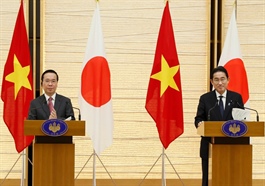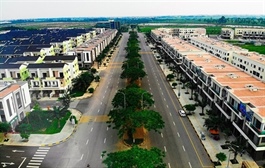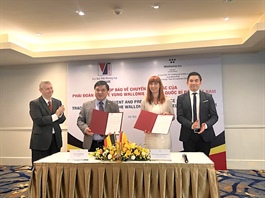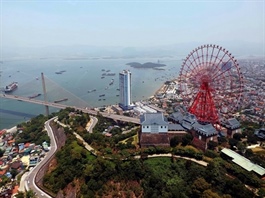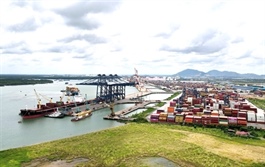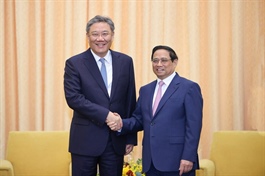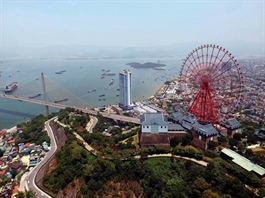Compliance with sustainability norms will strengthen Việt Nam-EU economic ties: conference
Compliance with sustainability norms will strengthen Việt Nam-EU economic ties: conference
Adherence to the EU sustainability regulations would strengthen Việt Nam’s existing trade relations with the bloc and offer new development opportunities for the country, a forum heard in HCM City on Monday.
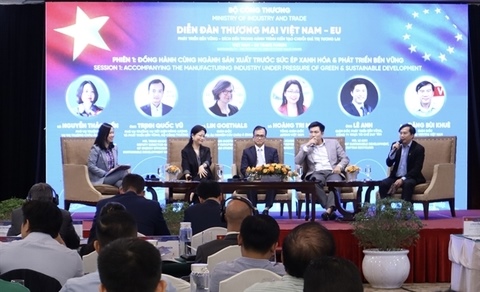
A panel discussion at the Việt Nam-EU Trade Forum held in HCM City on November 27. — VNA/VNS Photo |
Speaking at the Việt Nam-EU Trade Forum on “Sustainability – The Pathway to Create Future Value Chains,” Tạ Hoàng Linh, director general of the European – American Market Department, said the EU is now Việt Nam’s third largest export market and fifth largest import market.
Việt Nam has surpassed Singapore to become its largest trading partner among ASEAN members and is its 11th biggest supplier of goods, he said.
The Việt Nam-EU Free Trade Agreement (EVFTA), which took effect in August 2020, has enabled Vietnamese and EU goods to access each other’s markets, meeting the supply diversification needs of both sides, he said.
“Việt Nam is making efforts to pursue a green growth road map for sustainable development.
“With the great advantages accruing from the EVFTA and the upcoming EU-Vietnam Investment Protection Agreement, Việt Nam wants to attract more investment, technology transfer and support projects from EU partners to make its economic structure green and sustainable.”
EuroCham Chairman Gabor Fluit said Việt Nam's commitment to responsible environmental management and sustainable energy gives it a competitive edge.
“Việt Nam’s commitment to robust sustainability standards is a key driver of FDI, especially from Europe.
“By setting comprehensive green benchmarks in response to the growing demand for eco-friendly commodities and products, Việt Nam becomes a more dependable export market. This, in turn, encourages fresh European capital inflows and business opportunities in Việt Nam while simultaneously fostering consumer trust. This route also promises to create jobs and long-term prosperity.”
Within this framework, adherence to EU regulations like the carbon border adjustment mechanism (CBAM) and the corporate sustainability due diligence directive (CSDDD) is key to strengthening Việt Nam-Europe economic ties, he said.
Việt Nam's embrace of carbon pricing policies in line with CBAM will keep its exports competitive, and adhering to the CSDDD directives demonstrates its commitment to transparent, sustainable business practices, he said.
“With compliance in place, Việt Nam will safeguard its existing trade relations with the EU and open the door for new ones.
“However, this regulatory compliance requires substantial investments in infrastructure modernisation, green technology advancement, and human capital development.
“This includes attracting skilled talent, implementing training programmes, adapting educational programmes, and establishing rigorous standards for emissions reduction, environmental monitoring and compliance enforcement.
“Collective efforts in these areas, along with investments in data tracking systems, are critical for Việt Nam's success.”
Linh said: “Businesses need to proactively reform and improve their awareness and capacity to achieve green and sustainable growth.
It is an irreversible trend globally and mandatory if businesses want to embed themselves deeply in the global value chain.”
Nguyễn Quốc Khánh, R&D executive director at Vinamilk, said his company had adopted the circular economy model a long time ago.
Not just Europe but also many other markets around the world would soon require products to meet green and sustainable standards, and businesses would be unable to compete if they do not transform, he said.
“The initial investment needed for green transformation can be a barrier and a challenge to businesses, but then operating costs after the conversion are lower and their brands are more appreciated and trusted by consumers, thus helping businesses easily access more markets.
“It can be said that the benefits gained when businesses convert to green and sustainable production will be greater than the cost of conversion."
Airbus to expand supply chain in Việt Nam
Airbus is determined to expand its supply chain in Việt Nam though it is not an easy task, Hoàng Tri Mai, the European aircraft maker’s chief representative in Việt Nam, told the forum.
It “demonstrates our confidence in the future of Việt Nam’s aerospace sector.”
Việt Nam has great potential to play a pivotal role in the regional and global aviation markets thanks to its burgeoning workforce, dynamic manufacturing sector and robust infrastructure, she said.
To capitalise on opportunities, Vietnamese suppliers need to meet the high quality, safety and sustainability standards of global companies like Airbus, she said.
The aviation industry is taking steps towards reducing CO2 emissions, including introduction of new-generation aircraft and moving from conventional fuel to sustainable aviation fuel or SAF, she said.
“We believe that SAF is one of the best decarbonising solutions in the aerospace sector.
“An aircraft flying with 100 per cent SAF can reduce up to 80 per cent CO2 emissions.”
SAF, made from sustainable feedstock, is still in its nascent phase, she said.
Việt Nam has potential for SAF production thanks to its availability of molasses and biomass residues, she said.
So the Government and other agencies should work together to develop policies and incentives and mandate the production and use of SAF, she added.




